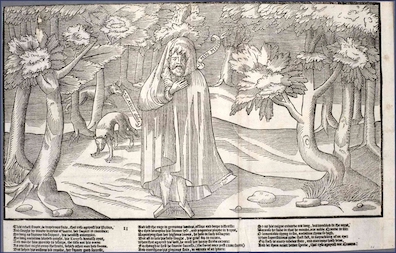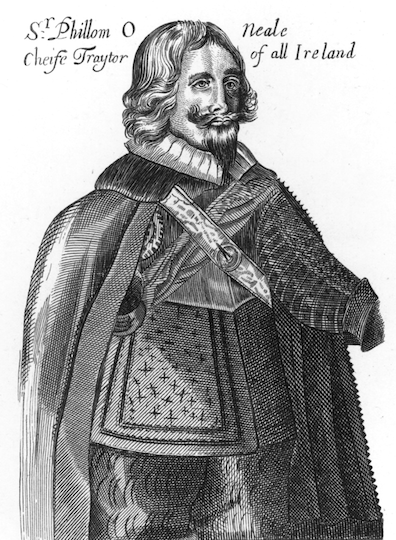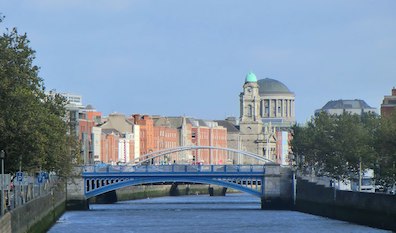Bloom is, of course,
"
bedight in sable armour" because he's wearing a black
suit. The word "bedight" (arrayed, bedecked) evokes late
medieval and early modern English: the
OED documents one
use in ca. 1400 and later ones in 1559 and 1598. "
O'Bloom"
too moves the temporal setting forward from
Cú
Chulainn's time. The prefix "Ó" (grandson or descendant
of) was not used before the 10th century and it became common
only in the 11th and 12th. After English rule was consolidated
in the 17th century the prefix was often dropped, but it had a
patriotic resurgence among 19th century families. It is not
unreasonable to suppose that by giving his Jewish protagonist
this kind of name Joyce was skewering Celtic Revival dreams of
resuscitating the glorious past, just as he did in the previous
Cyclops parody.
The name Rory suggests that he was thinking specifically of that
time when Tudor and Stuart monarchs attempted to assert control
over all of Ireland and subjugate the population with
plantations
awarded to Protestant loyalists. Either of two men with that
name could have inspired the portrait of Bloom as a fighter who
bravely enters the xenophobic lions' den of Barney Kiernan's.
Rory Oge O'More (ca. 1544-1578), the Lord of Laois, resisted the
efforts of two English queens to seize land in the midlands.
Many dozens of his relatives and fellow chieftains were
treacherously murdered at a feast thrown by the English in 1577,
and he was hunted down and killed in the following year. His
nephew Rory O'More, a.k.a. Sir Roger Moore (ca. 1600-ca. 1653),
was a landowner in the same region who, with three other
leaders, launched a
coup d'état in 1641, attempting to
seize
Dublin
Castle and overthrow the English regime. Informants
betrayed the plot, but during the 1641-53 Confederate Wars that
followed O'More fought on against the royalists with great
success, reducing English possessions to Dublin, Drogheda, and
Cork until the savagery of Oliver Cromwell turned the tide.
Gifford floats both names, while Slote, Mamigonian, and Turner
declare for the nephew, apparently because O'Bloom is called "
the
son of Rory" and the younger O'More is "referred to as
'the son of Rory Caoch' in the
Annals of Ireland." In
fact, though, Roger was the
grandson of Rory Caoch
O'More. His uncle Rory Oge O'More was one of the old man's sons,
so the expression applies better to him. The younger leader,
however, was a knight (Joyce may be echoing this in "sable
armour"), and his high ambition and considerable military
success have endeared him to Irish nationalists. After
independence, the bridge over the Liffey previously known as the
Barrack Bridge or Bloody Bridge was renamed Rory O'More Bridge
in his honor.
The word "prudent" is normally a compliment, but the
intention appears distinctly mocking when Joe Hynes,
exhibiting no gratitude for Bloom telling him that he can
collect his pay and no inclination to repay Bloom the money he
owes him, says, "'Twas the prudent member gave me the wheeze."
The narrator of Cyclops later recalls this tag when
Bloom politely declines to be treated to drinks, saying
scornfully, "Gob, he's a prudent member and no mistake."


